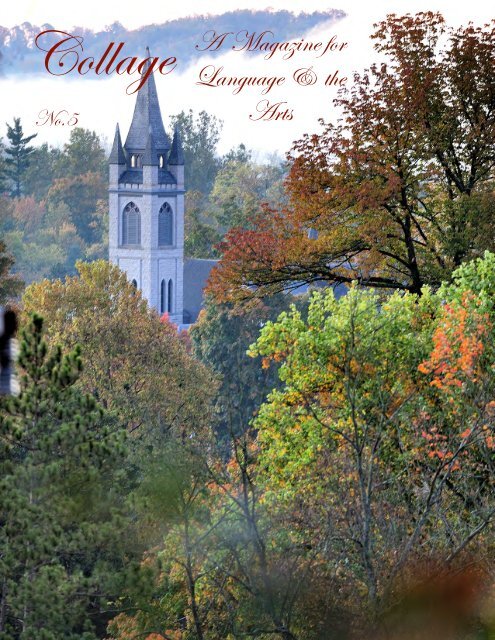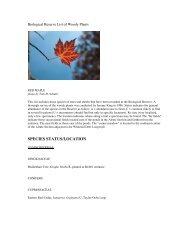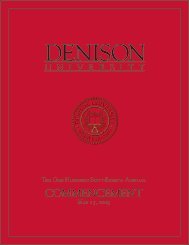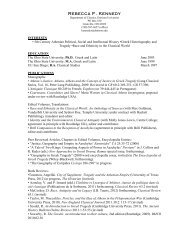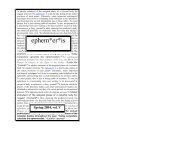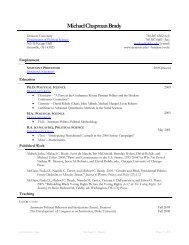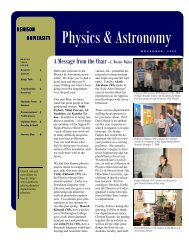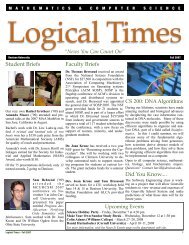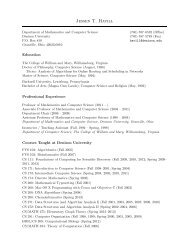Collage A Magazine for Language & the Arts - Denison University
Collage A Magazine for Language & the Arts - Denison University
Collage A Magazine for Language & the Arts - Denison University
You also want an ePaper? Increase the reach of your titles
YUMPU automatically turns print PDFs into web optimized ePapers that Google loves.
<strong>Collage</strong><br />
No.5<br />
A <strong>Magazine</strong> <strong>for</strong><br />
<strong>Language</strong> & <strong>the</strong><br />
<strong>Arts</strong>
<strong>Collage</strong><br />
A <strong>Magazine</strong> <strong>for</strong> <strong>Language</strong><br />
& <strong>the</strong> <strong>Arts</strong><br />
1
<strong>Collage</strong><br />
A <strong>Magazine</strong> <strong>for</strong> <strong>Language</strong> & <strong>the</strong> <strong>Arts</strong><br />
<strong>Collage</strong> is an interdisciplinary magazine designed to explore <strong>the</strong> poetry of language and <strong>the</strong><br />
visual arts. Submissions may include original poetry, short prose, and bilingual translations. All<br />
submissions must be accompanied by an English summary or translation and include <strong>the</strong> name of<br />
both contributor and translator. Images may be in black and white or color and must be submitted<br />
digitally. In <strong>the</strong> online version of <strong>the</strong> publication, we can also insert links <strong>for</strong> audio and video<br />
pieces.<br />
Editor<br />
Judy Pfau Cochran (cochran@denison.edu)<br />
Co-Editor and Technical Advisor<br />
Cheryl Johnson, Instructional Technologist (johnsonc@denison.edu)<br />
Student Editor and Technical Assistant<br />
Erica Paige Monnin<br />
Publisher<br />
Department of Modern <strong>Language</strong>s – <strong>Denison</strong> <strong>University</strong> – Granville – Ohio – USA<br />
Student Assistant<br />
Allyson Churchwell<br />
Cover Photographs<br />
Charles O’Keefe<br />
© all rights reserved<br />
3
Acknowledgements<br />
We would like to thank Mr. and Mrs. John B. Hutchins<br />
<strong>for</strong> <strong>the</strong>ir generous support through <strong>the</strong> Patty Foresman Fund.<br />
We would also like to thank Associate Provost Keith Boone<br />
and <strong>the</strong> Office of <strong>the</strong> Provost.<br />
4
Issue Contributors<br />
Charles O’Keefe • Xinda Lian • Gary Baker • Suzanne Baker • Marie-Madeleine Stey<br />
Caitlyn Fondessy • Christilyn Nailing • Sarah Link • Jesse Leary • Megan Fleming<br />
Emma Sombat • Grant Keeney • Bernardita Llanos • Joanna Mitchell • Eduardo Jaramillo<br />
Tori Coppinger • Laura M. Krull • Karen Hernández • Mara Wilber • Mónica Ayala-Martínez<br />
Bernardo Feitosa • Jessica Trumbull • Ingeborg Bachmann • Peter Filkins • Sadika Ramahi<br />
Michael Dunn • Ashley McKenna • Jacqueline Dennison • Nicole Myers • Shelley Pressman<br />
Erica Paige Monnin • Elizabeth Hubbard • Liza Hudock • Cara Downs • Manuel Martínez<br />
William J. Altman • Amy Ali • Hoshi Shin’ichi • Wagner Soto • Ben Gertzog • Caroline Denne<br />
Sibylle Freiermuth • Ksenia Golovkina • Ka<strong>the</strong>rine Harley • Jennifer Machen<br />
Justin McNeilly • Cynthia Porter • Lisa Savage • Thomas Simeone • Katelyn Yoder<br />
5
<strong>Collage</strong><br />
A <strong>Magazine</strong> <strong>for</strong> <strong>Language</strong> & <strong>the</strong> <strong>Arts</strong><br />
No. 5-Spring 2010<br />
Editorial<br />
by Judy Pfau Cochran<br />
This fifth issue of <strong>Collage</strong> is dedicated to <strong>the</strong> memory of Eduardo Jaramillo, native of Bogotá,<br />
Colombia, resident of Granville, Professor of Spanish and Latin American Studies, poet, mentor,<br />
and friend. In Rainer Maria Rilke’s words, Eduardo was one of those “destined <strong>for</strong> an early<br />
crossing.” We remember his time among us with affection and gratitude and celebrate his life<br />
with words and images, some of <strong>the</strong>m his own.<br />
6
When I first knew you, if I had chosen one quality to encompass you, it would have been<br />
your gentleness. True to your Latin heritage, you brought warmth and grace within <strong>the</strong> walls of<br />
<strong>the</strong> academy. Often, when we met on campus and were going <strong>the</strong> same way, you circled a<br />
companionable arm around my waist. It was not long however be<strong>for</strong>e you adopted a faster pace.<br />
In your years as Department Chair, you kept a stopwatch to monitor <strong>the</strong> administrative tasks<br />
allotted to various hours of <strong>the</strong> day. But <strong>the</strong> warmth remained: <strong>the</strong> outstretched hand, <strong>the</strong><br />
generous smile and <strong>the</strong> candid gaze.<br />
For two decades you were an integral part of my life. With o<strong>the</strong>r friends we celebrated<br />
every Christmas toge<strong>the</strong>r, <strong>for</strong>ging over <strong>the</strong> years our own extended family. Each year, when <strong>the</strong><br />
presents were unwrapped and <strong>the</strong> dishes cleared away, you took <strong>the</strong> youngest child on your lap<br />
and sang <strong>the</strong> spider song. As you sang, your fingers traced <strong>the</strong> itsy, bitsy spider’s climb up <strong>the</strong><br />
waterspout on <strong>the</strong> path of two small arms. When <strong>the</strong> rain came to wash <strong>the</strong> spider out, its abrupt<br />
cascade brought peals of laughter. Finally, when <strong>the</strong> sun came to dry up all <strong>the</strong> rain so that <strong>the</strong><br />
itsy, bitsy spider could begin its climb again, we said good night, grateful <strong>for</strong> <strong>the</strong> blessings of<br />
friendship and family.<br />
When you became a naturalized citizen of <strong>the</strong> U.S., you were so proud, and to celebrate<br />
everyone brought food in red, white and blue. Later, when you bought your house, you called<br />
excitedly: “Judy, I want to have a barbecue, what do I do?” I sent you to buy charcoal and a grill,<br />
<strong>for</strong>getting to mention that you would need cooking tools as well. Somehow we improvised. You<br />
made <strong>the</strong> simplest things fun and never failed to laugh on your own behalf. After <strong>the</strong> success of<br />
<strong>the</strong> barbecue, you tried your hand at desserts, arriving <strong>for</strong> dinner one evening brandishing a<br />
platter you presented as floating island. Stunned, I replied, “But Edo, this is an archipelago!”<br />
7
We didn’t always agree. Sometimes in haste, or weariness, one of us caused hurt or<br />
distress. However, each was quick to acknowledge <strong>the</strong> fault, <strong>the</strong> o<strong>the</strong>r to <strong>for</strong>give. This was <strong>the</strong><br />
gentle heart in you, never far from pardon. You knew me beyond <strong>the</strong> facade, accepting that<br />
deeper part of me, that pocket of reserve that allows <strong>for</strong> vulnerability.<br />
No one has ever successfully explained <strong>the</strong> meeting of minds that makes true friends. In<br />
one of his Essais, <strong>the</strong> Renaissance humanist Montaigne tried to encapsulate his lifelong<br />
friendship with La Boétie with <strong>the</strong>se few words: “Because it was he; because it was I.” (« Parce<br />
que c’était lui, parce que c’était moi ».) I can think of no clearer way to describe a friendship<br />
that recognized both strength and flaw, a trust that bridged that silent rift within <strong>the</strong> self, knowing<br />
kindness would be <strong>the</strong>re.<br />
From you I learned <strong>the</strong> com<strong>for</strong>t of candor, <strong>the</strong> healing of shared laughter and <strong>the</strong><br />
poignancy of loss. For me and countless o<strong>the</strong>rs, your presence will remain indelibly engraved in<br />
<strong>the</strong> tasks of everyday and <strong>the</strong> depths of our hearts.<br />
8
Photo courtesy of Gary and Suzanne Baker<br />
9
Photo by Charles O’Keefe<br />
“When I first saw <strong>the</strong> picture of a red tree on a gramophone jacket of Vivaldi’s The Four Seasons,<br />
I just could not believe that trees could be red.”<br />
Eduardo Jaramillo<br />
“The man who finds his homeland sweet is still a tender beginner; he to whom every soil is as<br />
his native one is already strong; but he is perfect to whom <strong>the</strong> entire world is as a <strong>for</strong>eign land.<br />
The tender soul has extended his love to all places; <strong>the</strong> perfect man has extinguished his.”<br />
10<br />
Hugh of St. Victor, The Didascalicon
Photo courtesy of Gary and Suzanne Baker<br />
12
<strong>Collage</strong> by Marie-Madeleine Stey<br />
13
Photos courtesy of Gary and Suzanne Baker<br />
14
Libro de los seres imaginarios / Book of Imaginary Beings<br />
Jorge Luis Borges in collaboration with Margarita Guerrero created a compilation of strange<br />
beings that have emerged from <strong>the</strong> human imagination over <strong>the</strong> centuries. From <strong>the</strong> study of<br />
various cultures, <strong>the</strong>y discovered <strong>the</strong> presence of reoccurring elements in <strong>the</strong>se imagined<br />
creatures across time and place. Borges mentions in his preface that this compilation is not to be<br />
read in a linear fashion; instead, <strong>the</strong> reader should refer to <strong>the</strong> text frequently and randomly<br />
choose pages to read, <strong>the</strong>reby creating a mental kaleidoscope of ever-changing <strong>for</strong>ms. The<br />
following images are <strong>the</strong> product of a sculpture class taught by Micaela Vivero to complement a<br />
literature course designed by Eduardo Jaramillo and taught by Bernardita Llanos.<br />
Un animal soñado por Kafka / Kafka’s Imaginary Animal<br />
Caitlyn Fondessy<br />
15
Una cruza /<br />
A Crossbreed<br />
Christilyn Nailing<br />
El Gallo Celestial /<br />
The Celestial Cock<br />
Sarah Link<br />
El Caballo del Mar /<br />
The Sea Horse<br />
Jesse Leary<br />
16
17<br />
El Pelícano /<br />
The Pelican<br />
Megan Fleming<br />
El Elefante que predijo el nacimiento<br />
de Buddha / The Elephant that<br />
Predicted <strong>the</strong> Birth of <strong>the</strong> Buddha<br />
Emma Sombat<br />
El Borometz / Barometz / Borametz /<br />
Vegetable Lamb of Tartary /<br />
Scythian Lamb<br />
[This legendary plant was believed to<br />
produce sheep as its fruit.]<br />
Grant Keeney
Pía Barros Writing Workshop<br />
These stories are <strong>the</strong> result of a workshop Chilean author Pía Barros held with a group of<br />
<strong>Denison</strong> students and faculty during her visit in February 2010. Barros is renowned <strong>for</strong> her work<br />
as a feminist and political activist who led grassroots political and artistic movements to<br />
reestablish democracy during <strong>the</strong> Pinochet dictatorship of <strong>the</strong> 1970s and 1980s. Justly famous<br />
<strong>for</strong> her fiction, she has encouraged <strong>the</strong> development of o<strong>the</strong>r writers, especially though her<br />
writing workshops.<br />
19
La despedida<br />
Bernardita Llanos<br />
This is <strong>the</strong> story of a wife who goes to visit her husband's tomb <strong>for</strong> <strong>the</strong> last time. She writes him<br />
a letter about her love and past sorrow. She wears a yellow dress to symbolize that she is finally<br />
able to move on with her life. Hers is a story of loss and trans<strong>for</strong>mation.<br />
Querido Julián:<br />
Hoy es el último día que vengo a visitarte al cementerio. He estado viniendo a verte y<br />
dejándote misivas secretas todas las semanas desde hace dos años. He me hecho amigas aquí,<br />
esposas, madres, hijas y hermanas que vienen a ver a los que partieron. Juntas hemos llorado y<br />
nos hemos dado aliento. A veces lloramos los jueves recordando y guardando los recuerdos de<br />
los que se fueron. He venido a traerte la noticia de que he tomado la decisión de cambiar mi vida.<br />
Lo he decidido hoy, precisamente, el 13 de octubre, el día de tu cumpleaños. Quiero que sepas lo<br />
mucho que te he querido y lo difícil que tu ausencia ha sido para mí este tiempo. Pero he<br />
comprendido que no puedo seguir llorando ni viniendo a verte todas las semanas por el resto de<br />
mi vida. Finalmente, descubro que no lloro todas las noches y que la pena se ha ido. Sabes que<br />
me he vestido de negro estos dos años y que hoy es la primera vez que llevo un vestido nuevo y<br />
amarillo. Esta es también mi última carta para ti y el inicio de una etapa nueva. Será una vida<br />
distinta a la que tuve contigo cuando fui tu mujer. Siento que soy libre por primera vez desde tu<br />
muerte. Tengo la fuerza para iniciar nuevas cosas. Es como si hubiera nacido de nuevo como si<br />
estuviera de vuelta después de estos largos años. Mañana parto de viaje y no sé cuándo volveré o<br />
si volveré, pero quería despedirme de ti y venirte a ver antes de irme. Tú sabes todo lo que fuiste<br />
para mí y eso lo llevaré conmigo. Estarás siempre en mi memoria. Tu María Rosa<br />
20
Photo by Charles O’Keefe<br />
21
Photo by Charles O’Keefe<br />
22
Una petición<br />
This story imagines an encounter between a hotel proprietor and three tired strangers.<br />
Joanna Mitchell<br />
Tres figuras pasaban por la carretera polvorienta, encorvadas por el cansancio tal que no se<br />
les veían las cabezas encima de los hombros. Desde el balcón del hotel las veía acercarse. Sin<br />
quitarles sus ojos se inclinó para acariciarle la cabeza al siamés a su lado. Por fin, los tres<br />
desconocidos alcanzaron la calle pedrada del pueblo y en pocos pasos estaban delante del hotel.<br />
Levantaron los ojos secos al hombre que había vigilado su progreso desde el horizonte.<br />
- Señor, ¿hay un cuarto disponible aquí?<br />
En el balcón la corbata de humita del hombre temblaba en la brisa. Dio una vuelta y desapareció<br />
por la puerta de la planta superior, el siamés tras él meneando la cola. El polvo que los envolvía<br />
había bajado cuando los de la calle – un hombre y dos muchachos flacos – vieron salir la misma<br />
corbata de la puerta inferior. El propietario respiraba agitado como si él hubiera caminado millas<br />
y no ellos.<br />
- Señor, ¿aquí hay un cuarto disponible?<br />
Les miró las caras tostadas por el sol, la ropa polvorienta y los cuerpos escuetos de los<br />
muchachos y estiró un poco su camisa blanca, cerrada en los puños con colleras y en el cuello<br />
por la corbata de humita.<br />
- Sí, hay. Y entró bruscamente otra vez por la puerta.<br />
Le siguieron los viajeros, pasando por una sala de recepción y entrando a un pasillo tan oscuro<br />
que después de soportar el impacto del sol tantas horas no pudieron ver nada en la penumbra<br />
repentina. Llegando al fondo del pasillo, percibieron al hombre de la corbata delante de una<br />
puerta. No la abrió sino que señaló una puerta pequeña en la parte inferior. El recién llegado la<br />
miró y luego levantó la vista otra vez a los ojos del otro, ahora preocupados.<br />
- Es que mi gato se metió adentro y no encuentro la llave. ¿No podría uno de sus hijos<br />
entrar por la puertita y sacármelo?<br />
23
Photo by Eduardo Jaramillo<br />
24
Photo by Charles O’Keefe<br />
25
Sangre en las calles<br />
Tori Coppinger<br />
El sonido del golpe fue muy fuerte. El hombre cayó al piso. Su cuerpo, una vez lleno de<br />
vida, ahora tirado en la calle. Toda la gente vio el accidente y vio que el hombre ahora estaba<br />
muerto. Pero les dio igual ya que no era la primera vez que veían la muerte de una persona<br />
inocente en medio de la calle. Siguieron con sus propias vidas hasta que vieron algo raro. Vieron<br />
que por un solo hueco en uno de los costados del cuerpo salía toda la sangre de una manera muy<br />
ordenada. La sangre creó un charco en la calle, undulando por ella e hizo hasta cúmulos<br />
pequeños en el pavimento.<br />
En la sangre había una expresión visual de todos los eventos de la vida del hombre. Todos<br />
los transeúntes vieron su infancia, su música, su arte. Vieron el amor que le tenía a su esposa y<br />
vieron el día en que se casaron. Vieron el amor inmenso que sentía por su hijo y el día en que<br />
nació él. Vieron el auto que lo había matado ese mismo día.<br />
Todas esas imágenes que vieron las personas en la calle estaban bajo sus pies. Bajando<br />
por las calles de la cuidad donde había crecido. Ese día de enero fue el último mientras el<br />
pavimento poroso absorbía su vida y su historia.<br />
26
Blood on <strong>the</strong> Streets<br />
Translated by Cheryl Johnson<br />
The thud was very loud. The man fell to <strong>the</strong> ground. His body, once full of life, was now<br />
stretched out on <strong>the</strong> street. Everyone saw <strong>the</strong> accident and saw that <strong>the</strong> man was now dead. It did<br />
not bo<strong>the</strong>r <strong>the</strong>m in <strong>the</strong> least, since this was not <strong>the</strong> first time that <strong>the</strong>y had witnessed an innocent<br />
person’s death in <strong>the</strong> middle of <strong>the</strong> street. They continued on with <strong>the</strong>ir lives until <strong>the</strong>y saw<br />
something strange. They saw that through a single hole in <strong>the</strong> man’s side blood flowed in a very<br />
orderly way. The blood created an undulating pool in <strong>the</strong> street making little clouds on <strong>the</strong><br />
pavement.<br />
In <strong>the</strong> blood were visual images of all of <strong>the</strong> events in <strong>the</strong> man’s life. All <strong>the</strong> passers-by<br />
saw his childhood, his music, his art. They saw <strong>the</strong> love that he had <strong>for</strong> his wife and <strong>the</strong> day <strong>the</strong>y<br />
were married. They saw <strong>the</strong> immense love that he felt <strong>for</strong> his son and <strong>the</strong> day he was born. They<br />
saw <strong>the</strong> car that had killed him on that very day.<br />
All those images that <strong>the</strong> people on <strong>the</strong> street saw were under <strong>the</strong>ir feet, flowing down <strong>the</strong><br />
streets of <strong>the</strong> city where <strong>the</strong> man had grown up. That January day was his last as <strong>the</strong> porous<br />
pavement absorbed his life and his story.<br />
27
Photo by Judy Pfau Cochran<br />
28
El Río<br />
Laura M. Krull<br />
Two boys <strong>for</strong>m a friendship that is marked and eventually destroyed by <strong>the</strong> river that runs<br />
between <strong>the</strong>m.<br />
Se peut-il rien de plus plaisant qu'un homme ait droit de me tuer parce qu'il demeure au-delà de<br />
l'eau et que son prince a querelle contre le mien, quoique je n'en aie aucune avec lui.<br />
¿Puede haber algo más ridículo que la pretensión de que un hombre tenga derecho a matarme<br />
porque habita al otro lado del agua y su príncipe tiene una querella con el mío aunque yo no la<br />
tenga con él?<br />
Les Pensées, 294<br />
Blaise Pascal<br />
****<br />
Hay muchas historias que viajan sobre las olitas del río. La sangre las trajeron acá. Son<br />
historias tristes, de guerras, pistolas y personas muertas que todo el mundo ha olvidado. Pero el<br />
río no olvida. La sangre es parte del río, un corriente de rojo feo que susurra las historias<br />
horribles. Nadie quiere oírlas, pero todos ven la sangre, una advertencia de lo que ha pasado. La<br />
sangre continuará a traer más historias al río, para que otras personas las oigan un día. El río<br />
correrá con las historias al mar para siempre.<br />
Y a veces, cuando la sangre es la de los niños, parece que el río corre más rápido.<br />
****<br />
Pishón caminó en el desierto. A él le gustaba; le gustaban el silencio, los rayos calientes<br />
y cariñosos del sol en el cuello, los cactus que nunca le preguntaban nada. Cada vez que<br />
caminaba en el desierto, era hasta el río, y él estaría de pie con un metro entre él y el río abajo.<br />
A veces se sentaba con sus piernas colgando en el aire arriba del río. Él miraría al otro lado y<br />
pensaría en él, en que pasaba allá durante la noche . . .<br />
Había muchas historias en su casa sobre el río. Toda su vida había escuchado a las<br />
historias. A su hermano mayor le gustaba muchísimo escuchar a su padre hablar de sus<br />
29
ocupaciones durante la noche. A él le gustaban los horrores de la noche, los cuentos de vidas que<br />
terminaron temprano, la sangre que viajaba al río.<br />
Durante la noche, sí, el otro lado era algo misterioso y diferente. Pero durante el día<br />
Pishón pensaba que no era ni peligroso ni extranjero. Le parecía a él como su lado del río, un<br />
desierto marrón. Quiero pasar al otro lado un día. Quiero saber si las personas son<br />
diferentes . . . la tierra no me parece así. Es posible que un . . .<br />
Se acercó al río. Algo estaba en el otro lado. Alguien que también movió hacia al río.<br />
Sus pensamientos volaron. Nunca había visto nadie en el otro lado.<br />
El joven de otro lado había parado, y los dos jóvenes se miraron. Me parece a mí, pensó<br />
Pishón. El otro niño era tan alto como Pishón, pero más delgado. Su cara estaba sucia, su ropa<br />
hecho jirones. Pishón observó que él estaba descalzo.<br />
“Bonjour.”<br />
“Hola,” respondió. Es verdad, se le ocurrió, que hablan otro idioma allá. El idioma de la<br />
garganta, como papá me dice cada día. Apuntó a su pecho. “Pishón. Me llamo Pishón.”<br />
“Bonjour Pishón. Je m’appelle Asheron. Est-ce que tu parles français?”<br />
Pishón lo miró, pero no le entendió. “¿Hablas español? Yo sé hablar español.”<br />
“Espagnole, non. Français, oui.”<br />
“No hablo francés. Espérame un momento . . .” Asheron no entendería su frase de<br />
espera. Es imposible, gritó en la mente. Es el otro lado. No es posible, nadie nos ayudará . . .<br />
“Est-ce que tu as un dictionnaire?” Asheron abrió y cerró sus manos como un libro.<br />
“¿Qué?”<br />
“Un dictionnaire. Regarde ici . . . hola et bonjour. Francés . . . et français,” enfatizando<br />
la diferencia sutil entre las dos palabras.<br />
“¡Un diccionario! Sí, sí yo tengo . . . hmm, francés, ¿yo as?”<br />
“Non, j’ai . . . j’ai un diccionario. Yo no,” y apuntó a su camiseta marrón. “No<br />
diccionario. Est-ce que TU as un diccionario?”<br />
“Ouais, j’ai un dictionnaire,” respondió Pishón.<br />
“Au revoir. Je t’attends ici. Au revoir!” Asheron le saludó con la mano.<br />
30
Pishón empezó a correr. “Voy a buscar un diccionario,” susurró al aire. “Sé que mi<br />
madre tiene uno . . . vamos a hablar. Voy a buscar un modo para que podamos hablar . . .”<br />
****<br />
“Encontrar un diccionario,” dijo Asheron, sentándose al lado del río, las rodillas en la<br />
tierra. Él agitó un diccionario con una sonrisa amplia.<br />
Pishón sonrió también. “Très bien.” Se quedaron en silencio. Tres semanas habían<br />
pasado desde que se encontraron por primera vez. Pishón se preguntó durante el silencio cómo<br />
sentiría el agua si tocara las olas. Era peligroso bajar al río. Un día . . . un día sabría cómo siente<br />
el agua, cómo es el otro lado. Miró a Asheron otra vez. “El lado tuyo me parece como el lado<br />
mío.”<br />
Asheron tiró las páginas del diccionario rápidamente. “No, tu lado tener comida y . . .<br />
y . . . poder. Tu lado matar mi lado. Je querer, je veux . . . tu lado.”<br />
“¿Pero estás . . . tú estás contento, no? Familia, amis, amor . . .”<br />
“Je? Je? Non, tu lado más . . . plus joie. Mais nous, non. Nous,” y aquí mostró con los<br />
brazos débiles y delgados todo su lado. “Regarde, nous n’avons pas la joie.”<br />
****<br />
“Te esperaba por mucho tiempo,” dijo Pishón, el momento que llegó al río y podía ver la<br />
figura alta en el otro lado. “Por los últimos dos años, yo caminaba al río casi cada día,<br />
buscándote y esperándote. ¿Somos amigos, no? ¿Recuerdas los días cuando teníamos catorce<br />
años, y hablábamos cada día?”<br />
“Mi madre me dijo hace dos años que no pudiéramos ser amigos.”<br />
“¿Por qué no?”<br />
“Porque vives en el lado malo del río. Eres el enemigo, Pishón. En la mente de mi<br />
madre, tu eres un asesino.”<br />
“Me disgustan la sangre, la violencia y las historias de mi padre. No me parece que eres<br />
enemigo mío. Eres mi amigo, y además, sólo es un río. Es un río, Asheron, no una regla . . .”<br />
“¡Alguien le mató a mi padre!” Pishón se quedó inmóvil. Su piel llegó a ser frío y sus<br />
dedos temblaron con el viento que pasó por el río. Sus ojos abrieron como los ojos de un animal<br />
31
que tenía miedo de todo el mundo. “Mi padre está muerto porque alguien le mató,” gritó otra<br />
vez.<br />
“Pero yo no lo maté . . . no es la culpa mía, Asheron. No es la culpa mía que vivo en este<br />
lado y tú vives en el otro lado. No es la culpa nuestra que el río está aquí.”<br />
“Es la . . . que me dices, ¿culpa? sí, es la culpa de los poderes que el río que divide la<br />
tierra también rompe nuestros corazones.”<br />
****<br />
La última vez que vi a Asheron fue cuando teníamos dieciséis años, hace tres años,<br />
cuando él me mostró una cicatriz en su abdomen. Habló de ella y del dolor que siguió el ruido<br />
de la pistola. Habíamos tenido una conversación cuando teníamos, no sé, catorce años, de que<br />
no podíamos ser amigos. Sonrío ahora pensar de nuevo en esta conversación, porque éramos<br />
amigos por dos años más. El río dividió nuestros cuerpos, pero fuimos del mismo corazón.<br />
Encontré el diccionario que usé para comunicar con él, y por eso estoy pensando otra vez<br />
en las tardes que pasé cerca del río. Asheron . . . no he explicado a nadie qué hacía las tardes que<br />
corría de la casa. Asheron es el secreto mío, el amigo prohibido del otro lado, el enemigo . . . la<br />
última vez, me dijo que no me esperaría más. Me confió que a veces quería matarme. Cuando<br />
tenía catorce años, no entendí como podía decir algo así, pero ahora es claro.<br />
Yo siempre era el enemigo. Para mí, era fácil ser amigos con él, porque mi vida era feliz<br />
y contenta aquí en . . . en este lado. Y él . . . mientras los años pasaban, no podía aceptar la idea<br />
de que yo estaba completamente satisfecho y él no. Se ponía furioso porque nací en este lado, el<br />
lado con beneficios, y él en el otro lado, y sólo el río decidió la diferencia. Me dijo que una vez<br />
entrará en el lado mío . . .<br />
Debo confesar, a veces regreso al río y me siento en la tierra y miro al otro lado. No sé<br />
qué espero, pero estoy esperando algo. Tal vez una linterna, una cara iluminada por la luz . . . he<br />
imaginado muchísimas veces que he visto a Asheron otra vez para que pueda saber que todavía<br />
vive . . . y sé que sueño, con todo mi cuerpo, que una vez habrá unos golpes en la puerta, y<br />
cuando lo abro, encontraré la cara de Asheron . . .<br />
La puerta abre ahora . . . mi padre y mi hermano han regresado después de una noche en<br />
el desierto. No puedo mirarlos después de una noche así . . . cada vez me imagino la cara de un<br />
32
hombre que nunca conocí, pero su cara me asalta durante las noches, y su sangre, el mismo<br />
sangre que vive en Asheron, está en el río . . .<br />
Mi padre siempre regresa con historias repugnantes de que pasa por la noche, de la<br />
sangre, de los muertos . . . no, no que no . . . que . . . permítame. . .<br />
****<br />
Sólo es un río que pasa con inocencia desde un lugar hasta otro. El río es inocente en su<br />
propia existencia, pero ha visto cosas horribles y vidas terminadas tempranas e historias<br />
deprimidas. El río, en su inocencia, ha destruido familias. A pesar de la inocencia, el río está<br />
inundado con sangre.<br />
****<br />
Veo al otro lado, al lado que nunca conoceré. . . y miro al río feo. Me disgusta el río, con<br />
las historias que no quiero oír, trayendo las historias y la sangre que causa . . . “matamos a dos<br />
hombres esa noche” . . . pero no, la sangre no los causa, el río causa los problemas . . .“y cuando<br />
rompimos la ropa del cuerpo del más joven” . . . el río es lo que crea ese lado y aquel lado y sus<br />
susurras nos recuerdan de que el río es el poder aquí . . . “encontramos una cicatriz en el<br />
abdomen” . . . el río nos recuerda de las cosas que queremos olvidar . . . “el hijo de puta había<br />
tratado de cruzarlo antes” . . . no es mi lado, ni el otro lado . . . es el río. El río . . . el río de<br />
muerte . . .<br />
Je deteste la rivière.<br />
33
Perdido dentro de otro mundo<br />
Karen Hernandez<br />
“Lost Within Ano<strong>the</strong>r World” is a story about a professor and his books – open books, closed<br />
books, old books, new books, large and small books, books everywhere in his home. One day he<br />
determined that he would lock himself in his library and read every book he had. He did not stop<br />
reading until he read every book he owned. When he finished, he had a problem – no more books<br />
to read. He emerged into <strong>the</strong> outside world and began to search <strong>for</strong> more books to read. He came<br />
upon a library with 15 floors and was immediately greeted with small hands coming from<br />
various books all tugging on him at once. It is not known if he continues to read in that library or<br />
ano<strong>the</strong>r, but his spirit can be felt in all libraries.<br />
Muchos libros, libros abiertos, libros cerrados, libros viejos, libros nuevos, libros<br />
pequeños, libros grandes, libros colocados por todos lados de la casa del profesor. El profesor era<br />
un gran profesor en la mejor universidad del país, donde daba clases en teología y filosofía. Pero<br />
el profesor tenía un gran problema, él se pasaba demasiado tiempo leyendo sus libros o cualquier<br />
libro que pudiera obtener en vez de enseñar sus clases. Sus ausencias en la universidad resultaron<br />
en su despido, pero esto no fue un problema para él porque su interés en la literatura era más<br />
grande que sus lecciones. Entonces él decidió encerrarse en su biblioteca enorme para poder leer<br />
todos los libros que él tenía.<br />
Su dedicación a la literatura era tan grande que no salía de la biblioteca y no paraba de<br />
leer hasta que terminara el libro. Cuando terminó de leer un libro ya tenía otro abierto y listo para<br />
continuar. Llegó el momento donde él ya no tenía contacto con el mundo exterior y solamente lo<br />
tenía con el mundo presente en los libros. Pasaron días, semanas y meses hasta que por fin<br />
terminó de leer todos los libros en su biblioteca. Como ya no tenía nada más que leer, él decidió<br />
salir al mundo exterior para buscar más literatura para seguir leyendo.<br />
El profesor hizo un viaje en busca de una nueva biblioteca o cualquier otro lugar que<br />
tuviera libros nuevos para él. Durante su viaje, él llegó a una biblioteca enorme de quince pisos,<br />
quince pisos de libros con un sinfín de in<strong>for</strong>mación. Al entrar él no sabía por dónde empezar o<br />
cuál libro leer. De tanta emoción, de repente empezó a ver manitas que salían de los libros,<br />
jalándolo por la chamarra y el pantalón para que escogiera esos libros para leer. No sabía cuál<br />
34
escoger, estiró la mano y agarró el primero que alcanzó. Se sentó enfrente de un librero y<br />
empezó a leer y siguió leyendo hasta que terminó con el librero. Después de un librero se movía<br />
al siguiente, siempre con las manitas jalándolo de un libro al otro.<br />
Aparentemente, él desapareció entre los libreros de la biblioteca y no se sabe si sigue en<br />
esa o en otra. Hay historias que cuentan de que el profesor sigue leyendo en bibliotecas,<br />
buscando algo nuevo que leer. No se sabe si las historias son ciertas o mentiras, pero su espíritu<br />
se siente cuando uno entra a una biblioteca. Otros cuentos dicen que ven al profesor vagando por<br />
los estantes.<br />
Photo by Charles O’Keefe<br />
35
Photo by Charles O’Keefe<br />
36
Photo by Eduardo Jaramillo<br />
37
Photo by Eduardo Jaramillo<br />
38
Photo by Charles O’Keefe<br />
39
Photo by Charles O’Keefe<br />
40
La realidad de lo imposible<br />
Mara Wilber<br />
In this story a little girl, Isabel, who is picked on in school finds refuge in her close relationship<br />
with her grandfa<strong>the</strong>r. The two of <strong>the</strong>m spend hours toge<strong>the</strong>r sharing stories, jokes and just<br />
enjoying each o<strong>the</strong>r's company. Her grandfa<strong>the</strong>r teaches her that life does not end with death;<br />
instead it is a cycle that is necessary to make room <strong>for</strong> new life. He reassures her that life is<br />
everywhere and in all <strong>for</strong>ms, and he shares with her that he hopes to become a cardinal. One day<br />
he becomes very ill and Isabel begs him not to die. He tells her not to worry because he loves<br />
her, he will be with her always and perhaps he will be able to return as a cardinal. One day, after<br />
Isabel's grandfa<strong>the</strong>r has died, a group of kids approach her and push her into <strong>the</strong> street. A car is<br />
headed toward her when suddenly a cardinal swoops down and causes <strong>the</strong> driver to stop short.<br />
The cardinal looks at Isabel with familiar eyes be<strong>for</strong>e flying off.<br />
Cuando era niña, pensaba que la vida era la cosa más especial y que nadie tenía más<br />
espíritu que el que se tiene mientras se vive. Pero cuando tenía doce años, aprendí que aunque<br />
alguien está muerto, hay cosas que todavía pueden tener un impacto en su vida. El espíritu existe<br />
después de la vida.<br />
De niña, era feliz y viva. Pero en la escuela no tenía muchos amigos porque también era<br />
tímida. Mi pelo era corto y sencillo y muchos de mis compañeros de clase me lo tomaban. Era<br />
muy baja y delgada también. Por eso, pasaba mucho tiempo con mi abuelo Jorge. Lo visitaba en<br />
su casa cada día después de la escuela para hablar, compartir las historias, y jugar. Mi abuelo era<br />
mi mejor amigo. Siempre me decía, “Tienes ojos muy bonitos, brillan como joyas azules. Eres<br />
muy especial. No debes escuchar a los otros niños de la escuela.” Me alegraba tener un amigo<br />
tan simpático como mi abuelo Jorge.<br />
Mi abuelo también me daba esperanza. Me decía cuentos de su juventud, pero también<br />
me decía cuentos de magia y fantasía. Él creía en los fantasmas.<br />
“La vida no termina con la muerte. Uno puede estar muerto, pero su espíritu siempre<br />
vive.” me dijo.<br />
“¿Cómo sabes esto?” dije.<br />
“El espíritu nunca muere, solamente el cuerpo muere. No hay prueba, simplemente<br />
tienes que experimentarlo.” Con eso, mi abuelo sonrió. “Mira,” y señaló afuera de la casa, “hay<br />
41
mucha vida en el mundo…en todas las <strong>for</strong>mas: animales, plantas, personas. ¿Cómo sabes que no<br />
tenían una vida antes de la vida que están viviendo hoy? Cuando muera, quiero hacerme un<br />
cardenal. Es mi deseo.”<br />
amigo.<br />
“¿Por qué se necesita morir?” No quería pensar en la muerte de mi abuelo; mi mejor<br />
“Es necesario morir para que haya nueva vida. Es un ciclo. No te preocupes, todavía<br />
tienes mucho tiempo antes de morirte.” Siempre pensaba que mi abuelo era sabio pero<br />
eventualmente me di cuenta de que era más sabio de lo que pensaba.<br />
Durante todos esos años mi abuelo y yo compartíamos cuentos, bromas, sentimientos y<br />
recuerdos inolvidables. Pero mi abuelo era viejo. A medida que el tiempo pasó, mi abuelo se<br />
enfermó. El día cuando cumplí doce años, mi abuelo murió.<br />
Mi madre y yo estábamos cocinando el pastel de mi cumpleaños en el horno cuando, de<br />
repente, sonó el teléfono. Era mi abuelo. Se sentía muy enfermo. Apenas podía hablar. Mi<br />
madre llamó al hospital mientras yo corría a la casa de mi abuelo. Lo encontré en su cama.<br />
“¡Abuelo, abuelo! No mueras…”<br />
“Isabel, la muerte es una parte de la vida, una parte importante. No te preocupes.<br />
Siempre estaré contigo. Te protegeré y nunca te dejaré. Quizás podré ser un cardenal. Te<br />
quiero, Isabel.”<br />
Mi abuelo murió después de llegar al hospital. Estaba muy triste. Ya no tenía más a mi<br />
mejor amigo. Quería creer en las palabras de mi abuelo sobre la muerte pero no podía. Cada día<br />
los chicos de la escuela me tomaban el pelo y no podía ir a la casa de mi abuelo para hablar. Le<br />
echaba de menos. Pero un día, mi actitud cambió.<br />
Estaba caminando por la acera después de la escuela cuando una pandilla de chicos me<br />
cercó y me tomaron el pelo. Después, me empujaron en la calle. Caí y me herí el pie. Quise<br />
levantarme pero no pude. De repente, vi un carro que venía hacia mí; estaba acercándose. La<br />
conductora era una madre que no estaba prestando atención a la calle porque sus hijos estaban<br />
gritando. Creí que iba a morir pero en el último momento un pájaro voló enfrente del carro y se<br />
pegó contra la ventanilla. El carro frenó y paró inmediatamente. El pájaro estuvo en la calle a<br />
mi lado. Cuando miré el pájaro me di cuenta de que era un cardenal. El cardenal me miró. Sus<br />
42
ojos parecían familiares. Recordé las palabras de mi abuelo, “Siempre estaré contigo. Te<br />
protegeré y nunca te dejaré. Quizás podré ser un cardenal.” Me sentía en paz por primera vez<br />
después de la muerte de mi abuelo. El cardenal se volvió y voló de nuevo.<br />
La conductora salió del carro y corrió hacia mí. Ella me ayudó con el pie herido. Me<br />
dijo que solamente se me había torcido el tobillo. Me condujo a mi casa y habló con mi madre<br />
sobre el accidente. Pero no me importaba el tobillo. La única cosa en mi mente era el cardenal<br />
que me salvó. Sabía que el deseo de mi abuelo se había realizado. Él está libre y su espíritu<br />
todavía vive. Las palabras de mi abuelo son verdaderas. Aunque alguien esté muerto, todavía<br />
hay cosas que pueden pasar en su vida. El espíritu existe más allá, después de la muerte.<br />
43
Photo by Charles O’Keefe<br />
44
Photo by Charles O’Keefe<br />
45
Vazio<br />
Não sei onde eu me foi<br />
Estou num outro lado.<br />
Não posso precisar o nome<br />
desse pais onde eu moro<br />
precisar o endereco<br />
nem as cores da minha casa.<br />
O teu silencio me mandou alí.<br />
Me encaminhaou a<br />
este lugar onde<br />
ontem bati a porta e perguntei por mim<br />
este lugar onde<br />
a voz hostil de uma velha sem rosto<br />
me respondeu<br />
que eu tinha partido<br />
que fazia séculos tinha ido embora<br />
para o centro de mim mesma<br />
Written by Mónica Ayala-Martínez<br />
46
Emptiness<br />
I don’t know where I went<br />
I’m in ano<strong>the</strong>r side.<br />
I can’t specify <strong>the</strong> name<br />
of this country where I live<br />
specify <strong>the</strong> address<br />
nor <strong>the</strong> colors of my house<br />
Your silence sent me <strong>the</strong>re.<br />
Guided me to<br />
this place where<br />
yesterday I shut <strong>the</strong> door and called <strong>for</strong> me<br />
this place where<br />
<strong>the</strong> hostile voice of a faceless old woman<br />
answered me<br />
that I had departed<br />
that I had gone away centuries ago<br />
to <strong>the</strong> center of myself.<br />
Translated by Bernardo Feitosa<br />
47
Photo by Charles O’Keefe<br />
48
Verlassen<br />
Aber Deutschland ist so weit weg, sagst du.<br />
Du legst Wert auf die Entfernung, auf<br />
den Preis unserer Telefonanrufe<br />
und Flugkarten. Und ich?, fragst du. Ach, du,<br />
meine Liebe. Du weißt nicht über die<br />
andere, Grammatik und Redefluss,<br />
meine Manien. Du kannst nicht verstehen,<br />
du und deine Wissenschaft. Du kannst nie<br />
den Nervenkitzel der Wörter kennen.<br />
Chemie hat doch keinen Zauber für mich;<br />
ich studiere diese Sprache genau.<br />
Du denkst, dass ich wähle, aber meine<br />
Gefühle sind ein und dieselbe. Ich<br />
muss dort hin fahren, weil ich verliebt bin.<br />
Leaving<br />
But Germany is far away, you say.<br />
You emphasize <strong>the</strong> distance,<br />
<strong>the</strong> expenses of our telephone calls<br />
and plane tickets. And me?, you ask. Ah, you,<br />
my love. You don’t know about <strong>the</strong><br />
o<strong>the</strong>rs, grammar and fluency,<br />
my obsessions. You cannot understand,<br />
you and your science. You can never<br />
know <strong>the</strong> thrill of words.<br />
chemistry has no draw <strong>for</strong> me;<br />
I pore over this language.<br />
You think that I’m choosing, but my<br />
feelings are one and <strong>the</strong> same. I<br />
must go <strong>the</strong>re because I am in love.<br />
Written and translated by Jessica Trumbull<br />
49
An die Sonne<br />
Schöner als der beachtliche Mond und sein geadeltes Licht,<br />
Schöner als die Sterne, die berühmten Orden der Nacht,<br />
Viel schöner als der feurige Auftritt eines Kometen<br />
Und zu weit Schönrem berufen als jedes andre Gestirn,<br />
Weil dein und mein Leben jeden Tag an ihr hängt, ist die Sonne.<br />
Schöne Sonne, die aufgeht, ihr Werk nicht vergessen hat<br />
Und beendet, am schönsten im Sommer, wenn ein Tag<br />
An den Küsten verdampft und ohne Kraft gespiegelt die Segel<br />
Über dein Aug ziehn, bis du müde wirst und das letzte verkürzt.<br />
Ohne die Sonne nimmt auch die Kunst wieder den Schleier,<br />
Du erscheinst mir nicht mehr, und die See und der Sand,<br />
Von Schatten gepeitscht, fliehen unter mein Lid.<br />
Schöner Licht, das uns warm hält, bewahrt und wunderbar sorgt,<br />
Daß ich wieder sehe und daß ich dich wiederseh!<br />
Nichts Schönres unter der Sonne als unter der Sonne zu sein...<br />
Nichts Schönres als den Stab im Wasser zu sehn und den Vogel oben,<br />
Der seinen Flug, überlegt, und unten die Fische im Schwarm,<br />
Gefärbt, ge<strong>for</strong>mt, in die Welt gekommen mit einer Sendung von Licht,<br />
Und den Umkreis zu sehn, Geviert eines Felds, das Tausendeck meines Lands,<br />
Und das Kleid, das du angetan hast. Und dein Kleid, glockig und blau!<br />
Schönes Blau, in dem die Pfauen spazieren und sich verneigen,<br />
Blau der Fernen, der Zonen des Glücks mit den Wettern für mein Gefühl,<br />
Blauer Zufall am Horizont! Und meine begeisterten Augen<br />
Weiten sich wieder und blinken und brennen sich wund.<br />
Schöne Sonne, der vom Staub noch die größte Bewundrung gebührt,<br />
Darum werde ich nicht wegen dem Mond und den Sternen und nicht,<br />
Weil die Nacht mit Kometen prahlt und in mir einen Narren sucht,<br />
Sondern deinetwegen und bald endlos und wie um nichts sonst<br />
Klage führen über den unabwendbaren Verlust meiner Augen.<br />
Written by Ingeborg Bachmann<br />
50
To <strong>the</strong> Sun<br />
More beautiful than <strong>the</strong> remarkable moon and its noble light,<br />
More beautiful than <strong>the</strong> stars, <strong>the</strong> celebrated orders of night,<br />
Much more beautiful than <strong>the</strong> fiery display of a comet,<br />
And so much more beautiful than any o<strong>the</strong>r star,<br />
Because your life and my life depend on it daily, is <strong>the</strong> sun.<br />
Beautiful sun, which rises, remembering its tasks<br />
And completing <strong>the</strong>m, most beautiful in summer, when a day<br />
Shimmers on <strong>the</strong> coast and <strong>the</strong> calm mirror of sails<br />
Passes over your eye, until you tire and eventually doze.<br />
Without <strong>the</strong> sun, even art puts on a veil again.<br />
You cease to appear to me, and <strong>the</strong> sea and <strong>the</strong> sand,<br />
Lashed by shadows, hide beneath my lids.<br />
Beautiful light, which keeps us warm, sustains and marvelously ensures<br />
That I see again, and that I see you again!<br />
Nothing more beautiful under <strong>the</strong> sun than to be under <strong>the</strong> sun …<br />
Nothing more beautiful than to see <strong>the</strong> reed in <strong>the</strong> water and <strong>the</strong> bird above<br />
Pondering its flight and below <strong>the</strong> fish in <strong>the</strong>ir school,<br />
Colorful, shapely, come into <strong>the</strong> world on a beam of light,<br />
And to see <strong>the</strong> circumference, <strong>the</strong> square of a field, <strong>the</strong> thousand corners of my land,<br />
And <strong>the</strong> dress you have put on. Your dress, bell-shaped and blue!<br />
A beautiful blue in which peacocks strut and bow,<br />
The blue of distances, zones of joy with climates <strong>for</strong> my every mood,<br />
The horizon’s blue chance! And my enchanted eyes<br />
Widen again and blink and burn <strong>the</strong>mselves sore.<br />
Beautiful sun, which even from dust deserves <strong>the</strong> highest praise,<br />
Causing me to raise a cry, not to <strong>the</strong> moon,<br />
The stars, <strong>the</strong> night’s garish comets that name me a fool,<br />
But ra<strong>the</strong>r to you, and ultimately to you alone,<br />
As I lament <strong>the</strong> inevitable loss of my sight.<br />
From Darkness Spoken, translated by Peter Filkins<br />
51
Photo by Charles O’Keefe<br />
52
Photo by Charles O’Keefe<br />
53
Le Quotidien<br />
A vida se repete nos mínimos gestos<br />
Os dias passam, a ansiedade cresce<br />
Logo tudo acaba<br />
Parecemos viver a anos por hora.<br />
Também nos pequenos gestos<br />
Vivemos o momento alheio<br />
Despontamos novos sentimentos<br />
Ressuscitamos outros esquecidos.<br />
Do meu cotidiano, espero, espero...<br />
Espero até que chegues<br />
Espero por aquele momento em que tudo muda<br />
Pareço sair da vida minha, inteirar-me na tua<br />
E tu na minha, quiçá os dois em outra<br />
E vivo um eterno sonho momentâneo<br />
Para ser acordado pelo cotidiano.<br />
Quand reviendras-tu pour me lever et m'enlever?<br />
(Quando voltarás para me acordar e me levar?)<br />
Written by Bernardo Feitosa<br />
54
Routine<br />
Life repeats itself in <strong>the</strong> smallest of gestures<br />
As <strong>the</strong> days pass, <strong>the</strong> anxiety grows<br />
Soon everything ends<br />
We seem to live years in an hour.<br />
Also in <strong>the</strong> smallest gestures<br />
We live <strong>the</strong> <strong>for</strong>eign moment<br />
We arouse new feelings<br />
Revive <strong>for</strong>gotten ones.<br />
From my routine, I hope, I wait…<br />
I wait until you come<br />
I wait <strong>for</strong> that moment when everything changes<br />
I seem to leave my life, plunge into yours<br />
And you in mine, perhaps <strong>the</strong> two of us into a new one<br />
I live an eternal dream in a moment<br />
To be awoken by routine.<br />
Quand reviendras-tu pour me lever et m’enlever?<br />
(When will you come back to wake me up and take me away?)<br />
Translated by Bernardo Feitosa<br />
55
Photo by Charles O’Keefe<br />
56
Perguntas<br />
Quem sou eu?<br />
Tão pequena, tão minúscula<br />
Só uma bolinha de medo e de tristeza<br />
É estranho, não é?<br />
Um afeto intenso, vasto, nace em mim<br />
Me faz sentir cheia<br />
Me pega de improviso<br />
Me perturba tuda, me rouba<br />
E eu guardo ele,<br />
Eu o alimento<br />
O arrulho<br />
Com toadas que eu invento diariamente.<br />
Mas eu sinto pena por ele<br />
Porque é tão frágil<br />
Porte tenta sobreviver<br />
Sem por segurar nada.<br />
Questions<br />
Who am I?<br />
So small, so tiny<br />
Just a little ball of fear and sadness<br />
It’s weird isn’t it?<br />
An intense, vast affection blooms in me<br />
Makes me feel full<br />
Catches me off-guard<br />
Bo<strong>the</strong>rs all of me, steals from me<br />
And I keep it,<br />
I feed it<br />
The purr<br />
With tunes I invent daily.<br />
Yet I feel sorry <strong>for</strong> it<br />
Because it is so fragile<br />
Because it tries to survive<br />
Without being able to hold on to anything.<br />
Written by Mónica Ayala-Martínez and translated by Bernardo Feitosa<br />
57
Written and illustrated by Michael Dunn<br />
58
Snow<br />
Snow falling all day,<br />
falling all night,<br />
quietly covering all things.<br />
And I stood watching<br />
as a child, mesmerized,<br />
watching <strong>the</strong> white flakes<br />
concealing all things.<br />
Every leaf, every branch,<br />
robbed of its color.<br />
No bird chirping or flying,<br />
and I watching, mesmerized<br />
by its bright color<br />
concealing all things.<br />
Translated by Sadika Ramahi<br />
59
La neige<br />
Une couverture blanche<br />
cache tout en-dessous<br />
rien ne se fait entendre<br />
que des chuchotements<br />
doux.<br />
Effaçant les fautes,<br />
les méprises voilées<br />
rien ne se fait voir<br />
que la<br />
vérité<br />
de la vie,<br />
que la<br />
pureté<br />
de l’esprit.<br />
Derrière la vitre,<br />
les gens se laissent aller<br />
lentement,<br />
sans<br />
chaleur,<br />
comme des abeilles<br />
dans le froid<br />
attendant le soleil.<br />
Written and translated by Ashley McKenna<br />
60<br />
Snow<br />
A white blanket<br />
hides everything<br />
nothing heard<br />
except soft<br />
whispers.<br />
Erasing faults,<br />
mistakes covered<br />
Nothing seen<br />
but <strong>the</strong><br />
truth<br />
of life,<br />
<strong>the</strong><br />
purity<br />
of <strong>the</strong> spirit.<br />
Behind <strong>the</strong> glass,<br />
people drift<br />
slowly<br />
without<br />
warmth,<br />
like bees<br />
in <strong>the</strong> cold<br />
waiting <strong>for</strong> <strong>the</strong> sun.
Photo by Charles O’Keefe<br />
61
Photo by Charles O’Keefe<br />
62
Le Rêve passant, le souvenir fragile<br />
Il fait froid sur la montagne<br />
Où le vent du passé souffle assidûment<br />
Contre les ombres du ciel<br />
Les flocons de neige lumineux tombent<br />
Blanchissant les pierres et les couvrant<br />
Etincelant sous le reflet des étoiles<br />
Et comme une toile<br />
La montagne tient encore<br />
Et se moque de l’horizon contre lequel elle se rebelle<br />
Et le reflet d’argent<br />
Avec lequel sont peints des mots sages et muets<br />
Les diamants tenaces qui épinglent le ciel<br />
Les vérités argentées qui prophétisent au monde<br />
La montagne qui tient, fière et durable<br />
Survivra dans le souvenir<br />
Qui flotte sur le vent.<br />
The Passing Dream, <strong>the</strong> Fragile Memory<br />
It is cold on <strong>the</strong> mountain<br />
Where <strong>the</strong> wind of <strong>the</strong> past blows sharply<br />
Against <strong>the</strong> shadows of <strong>the</strong> heavens<br />
Bright snowflakes fall<br />
Whitening <strong>the</strong> rocks and covering <strong>the</strong>m<br />
Glistening with <strong>the</strong> reflection of <strong>the</strong> stars<br />
And just like a canvas<br />
The mountain still stands<br />
And mocks <strong>the</strong> horizon against which it rebels<br />
And <strong>the</strong> silver reflection, <strong>the</strong> paint<br />
With which wise but silent words have <strong>for</strong>med<br />
The tenacious diamonds that pin <strong>the</strong> sky up<br />
The silvery truths that prophesy to <strong>the</strong> world<br />
The mountain that stands, proud and durable<br />
Will last in <strong>the</strong> memory<br />
That floats on <strong>the</strong> wind.<br />
Written and translated by Jacqueline Dennison<br />
63
<strong>Collage</strong> by Nicole Myers<br />
64
Painting by Shelley Pressman, inspired by Renoir<br />
65
La vérité éphémère<br />
Chaque ombre exerce un singulier pouvoir,<br />
elle reflète l'éphémère vérité<br />
de la <strong>for</strong>me qui se fait voir,<br />
une <strong>for</strong>me qui se perd dans l'obscurité<br />
couleur, texture, profondeur,<br />
s'en vont vers l'éphémère.<br />
Chaque ombre révèle une singulier essence,<br />
façonnée selon les éléments,<br />
les saisons et les lumières qui dansent,<br />
chantant la beauté, rien ne dure<br />
couleur, texture, profondeur,<br />
s'en vont vers l'éphémère.<br />
Fleeting Truth<br />
Each shadow has a singular power,<br />
reflecting a fleeting truth<br />
of a <strong>for</strong>m revealed,<br />
a <strong>for</strong>m to be lost in obscurity<br />
color, texture, depth,<br />
move toward <strong>the</strong> abyss.<br />
Each shadow unfolds a singular essence,<br />
shaped by <strong>the</strong> elements,<br />
<strong>the</strong> seasons and <strong>the</strong> light dance,<br />
singing of beauty, nothing endures<br />
color, texture, depth,<br />
move toward <strong>the</strong> abyss.<br />
Written and translated by Erica Paige Monnin<br />
66
Photo by Erica Paige Monnin<br />
67
Drawing by Elizabeth Hubbard<br />
68
Avant notre<br />
naissance il y avait<br />
une plage, où de petits<br />
oiseaux sautillants<br />
mangeaient<br />
des<br />
créatures<br />
sabordant<br />
et écumant<br />
sur les rivages de l’aube,<br />
et le trésor se trouvait<br />
dans le vent et la baleine.<br />
Avant notre naissance il y avait une plage<br />
Et quand nous le trouvons, je baisse la chaleur,<br />
blanche,<br />
bleue,<br />
qui remplit notre ballon magnifique.<br />
Des couleurs dégonflées se bercent et frôlent comme une pastenague sur la grève;<br />
un grand feu s’enflamme.<br />
Ce soir le sceptre, le fenouil, et la plume sont à toi.<br />
Endossant les têtes de bisons et d’ours la cour danse ton histoire,<br />
exactement comme tu le mis à moi;<br />
la petite brute un âne bouffon et toi le héros lion.<br />
Written by Liza Hudock<br />
70
Be<strong>for</strong>e our<br />
birth <strong>the</strong>re was<br />
a beach, where little<br />
hopping birds ate<br />
scuttling foamy<br />
creatures<br />
on<br />
<strong>the</strong><br />
shore<br />
at sunrise,<br />
and treasure was found<br />
in wind and whalebones.<br />
And when we find it, I crank down <strong>the</strong> white,<br />
blue,<br />
hot,<br />
that fills our magnificent balloon.<br />
Be<strong>for</strong>e our birth <strong>the</strong>re was a beach<br />
As <strong>the</strong> deflated pattern of color rocks and skims <strong>the</strong> earth like a manta ray,<br />
a grand fire blazes.<br />
Tonight <strong>the</strong> scepter, fea<strong>the</strong>r, and fennel are yours.<br />
Donning buffalo and bear heads <strong>the</strong> court dances your story,<br />
just as you put it to me;<br />
<strong>the</strong> bully a donkey clown and you <strong>the</strong> lion hero.<br />
Translated by Liza Hudock<br />
71
Photo by Charles O’Keefe<br />
72
Written and illustrated by Cara Downs<br />
73
Photo by Charles O’Keefe<br />
74
Amante<br />
Sueño con encontrarte<br />
al doblar una esquina,<br />
al montar un avión,<br />
al rojo de un semá<strong>for</strong>o.<br />
Sueño que me dibujas<br />
con tus manos serenas,<br />
que sales a la vida<br />
a buscarme en la acera,<br />
a perderme en la playa,<br />
a encontrarme entre conchas,<br />
dibujada en la arena.<br />
Pero busco y te escondes<br />
te deslizas, te pierdes.<br />
Tú ya sólo respondes<br />
desde un silencio ajeno.<br />
Written by Moníca Ayala-Martínez<br />
75<br />
Lover<br />
I dream of finding you<br />
around <strong>the</strong> corner,<br />
boarding a plane,<br />
at a stoplight.<br />
I dream that you draw me<br />
with your serene hands,<br />
that you go out to life<br />
to search <strong>for</strong> me on <strong>the</strong> sidewalk,<br />
to lose me on <strong>the</strong> beach,<br />
to find me among shells,<br />
drawn on <strong>the</strong> sands.<br />
But I search and you hide<br />
you slip away, you hide.<br />
You now only respond<br />
from a <strong>for</strong>eign silence.<br />
Translated by Manuel Martínez
Ink drwaings by Amy Ali<br />
77
God created us all equal but it is our customs that divide us.<br />
-Confucius<br />
Calligraphy by William J. Altman<br />
78
Photo by Eduardo Jaramillo<br />
79
A Sor Juana<br />
No quiere la mar serena<br />
serenarse en la tormenta<br />
La atormenta la locura,<br />
la persigue la tristeza,<br />
la revuelca ya la cólera,<br />
la persiguen las sirenas,<br />
la alborotan los ahogados<br />
No quiere la mar serena<br />
serenarse en la tormenta<br />
Written by Moníca Ayala-Martínez<br />
80<br />
To Sor Juana<br />
The serene sea does not want<br />
to settle itself in <strong>the</strong> storm<br />
Madness torments her<br />
sadness pursues her,<br />
rage roils her,<br />
sirens run after her,<br />
<strong>the</strong> drowned disrupt her<br />
The serene sea does not want<br />
to settle itself in <strong>the</strong> storm<br />
Translated by Manuel Martínez
Photo by Charles O’Keefe<br />
81
Photo by Charles O’Keefe<br />
82
Photo by Gary Baker<br />
83
Bokko-chan<br />
Hoshi Shin’ichi<br />
The robot was skillfully made. It was a female robot. It could be made as beautiful as its<br />
creator wanted because it was artificial. All of <strong>the</strong> characteristics of a beautiful woman were<br />
ga<strong>the</strong>red to make a perfect beauty. Of course, she was a little prickly. But being prickly is one of<br />
<strong>the</strong> conditions of beautiful women.<br />
Nobody else had considered making a robot. It was ridiculous to think of building a<br />
robot that could work as well as a human. If one had <strong>the</strong> money to build such a machine, one<br />
could have built a very efficient robot that many people would want to use.<br />
84
It was built <strong>for</strong> fun. The bar owner made it. People like bar owners do not feel like<br />
drinking when <strong>the</strong>y get home. For someone like him, alcohol was what he used to make money,<br />
so he did not think of it as something to do. Because <strong>the</strong> drunks at his bar provided him with<br />
money, and he had <strong>the</strong> time he made <strong>the</strong> robot. It was really just <strong>for</strong> fun.<br />
Precisely because it was a hobby he was able to make an exquisite beauty. The touch of<br />
her skin felt like <strong>the</strong> real thing; no one could tell <strong>the</strong> difference. Better yet, on <strong>the</strong> surface she<br />
was better than <strong>the</strong> real thing.<br />
But her head was all but empty. He did not get around to it. She could only give simple<br />
responses, and <strong>the</strong> only thing she could do was drink sake.<br />
The bar master put her in <strong>the</strong> bar when he finished making her. The bar had tables with<br />
chairs, but he put her behind <strong>the</strong> counter. It would be troublesome if she did anything to reveal<br />
herself as a robot.<br />
Because she was <strong>the</strong> new girl, customers came in and started conversations with Bokko-<br />
chan. Only when she was asked her name and age could she respond accurately, but she was lost<br />
at anything else. Even so, no one noticed that she was a robot.<br />
“What’s your name?”<br />
“Bokko-chan”<br />
“How old are you?”<br />
“I am still young.”<br />
“Yeah, but how old are you?”<br />
“I am still young.”<br />
“Come on, answer <strong>the</strong> question.”<br />
“I am still young.”<br />
Because many of <strong>the</strong> bar’s customers are refined, no one questioned this matter fur<strong>the</strong>r.<br />
“You have pretty clo<strong>the</strong>s”<br />
“I do have nice clo<strong>the</strong>s”<br />
“What would you like?”<br />
“What would I like?”<br />
“Do you want a gin fizz?”<br />
85
“I want a gin fizz.”<br />
Bokko-chan drank a much as she wanted. Not only did she not get drunk, she was young<br />
and beautiful, standoffish and blunt in her responses. More customers ga<strong>the</strong>red in <strong>the</strong> bar through<br />
word of mouth about Bokko-chan. The customers talked with her, drank, and bought her drinks.<br />
talking.<br />
“Which customer do you like <strong>the</strong> most?”<br />
“Which customer do I like <strong>the</strong> most?”<br />
“Do you like me?”<br />
“I like you.”<br />
“Let’s go to a movie sometime.”<br />
“Should we go to a movie?”<br />
“When should it be?”<br />
When she was unable to respond, a signal was sent and <strong>the</strong> bar master rushed over.<br />
“Sir. You shouldn’t joke around like that with her.”<br />
After that, <strong>the</strong> customers usually came to an understanding, smiled wryly and stopped<br />
From time to time <strong>the</strong> bar master squatted to get <strong>the</strong> alcohol that collected in <strong>the</strong> plastic<br />
tube in Bokko-chan’s leg and served it to his customers.<br />
But <strong>the</strong> customers did not notice. Although Bokko-chan was young she was mature, nor<br />
did she make sticky-sweet, flattering comments, and even though she drank she did not lose<br />
control. For those reasons her popularity increased and <strong>the</strong> number of people who stopped by<br />
increased.<br />
Among <strong>the</strong> customers <strong>the</strong>re was a young man. He was passionate about Bokko-chan and<br />
he came regularly. She brushed away his love like a curtain in a restaurant door, but his love <strong>for</strong><br />
her continued to grow. So his tab grew and he could not pay. Time and time again he tried to take<br />
money from home, but his fa<strong>the</strong>r was furious with him.<br />
“Don’t go again! Use this money to pay your debt. But after that it’s finished.”<br />
He came to <strong>the</strong> bar to make his payment. Thinking that night would be <strong>the</strong> end, he drank<br />
up, and as a sign of <strong>the</strong> end of <strong>the</strong>ir relationship, he bought Bokko-chan a number of drinks.<br />
“I can’t come anymore”<br />
86
“You can’t come anymore”<br />
“Are you sad?”<br />
“I am sad.”<br />
“You’re really not that sad, are you?”<br />
“I am not really that sad.”<br />
“There is no one as cold as you”<br />
“There is no one as cold as me.”<br />
“Do you want me to kill you?”<br />
“Please kill me.”<br />
He took a medicine packet out of his pocket, unwrapped it and put it in a glass, which he<br />
<strong>the</strong>n pushed in front of Bokko-chan.<br />
“Do you want a drink?”<br />
“I will have a drink”<br />
Bokko-chan drank as he watched.<br />
“I hope you die,” he said.<br />
“I will die,” she said to his back as he turned to pay <strong>the</strong> owner and left. Night had fallen.<br />
When <strong>the</strong> young man stepped out <strong>the</strong> door, <strong>the</strong> master called out to <strong>the</strong> remaining<br />
customers,“ It’s my treat, so everyone drink up.” He called it ‘treating’ but <strong>the</strong> master merely<br />
took liquor <strong>for</strong> <strong>the</strong> customers from Bokko-chan’s plastic tube, because he did not think anyone<br />
else would come that night. The customers cheered, “Hooray” and “Alright! That’s great!” The<br />
customers and <strong>the</strong> women who worked at <strong>the</strong> bar all toasted each o<strong>the</strong>r. Even <strong>the</strong> master raised a<br />
glass behind <strong>the</strong> bar and drained it.<br />
That night, <strong>the</strong> lights at <strong>the</strong> bar were on very late. Music continued to stream from <strong>the</strong><br />
radio. Even though no one left, only <strong>the</strong> people’s voices died out.<br />
Soon <strong>the</strong> radio said “Good night,” and fell silent. Bokko-chan murmured “Good night,”<br />
<strong>the</strong>n waited with a prickly expression, thinking, I wonder who will come talk to me next.<br />
Translated by Wagner Soto and Ben Gertzog<br />
87
Photo by Eduardo Jaramillo<br />
88
Photo by Charles O’Keefe<br />
89
A Partida<br />
E já que não existem correntes que me prendam<br />
Nem vontades que me <strong>for</strong>cem<br />
De desistir desisto, e meus almejos me dominam<br />
Não deixarei arrependimentos retornarem<br />
Darei uma saída, a vida é breve,<br />
Antes que percebam, cá estou mais uma vez<br />
E quando a gente tudo teve<br />
Só tem a ganhar pelo que direito fez<br />
Por isso deixo minha marca momentânea<br />
Terá validade suficiente até meu retorno<br />
Nos corações e pensamentos, nostálgica coletânea<br />
Levo bagagem que com experiências novas adorno<br />
No fim, tudo será uma questão de momento<br />
Saudades? Nem o tempo permitirá!<br />
Agora tristezas, refutá-las nem tento<br />
O segundo seguido só alegrias trará!<br />
Written by Bernardo Feitosa<br />
90
Departure<br />
And since <strong>the</strong>re are no chains to te<strong>the</strong>r me<br />
Nor wills that <strong>for</strong>ce me<br />
I give up giving up and my desires dominate me<br />
I won’t let regrets return<br />
I’ll take a leave, life’s short,<br />
Be<strong>for</strong>e you notice, here I am once again<br />
And when we’ve had everything<br />
We only have to gain from what we did right.<br />
Hence I leave my momentary imprint<br />
It will be sufficiently valid until my return<br />
In <strong>the</strong> hearts and thoughts, a nostalgic compilation<br />
I take luggage that I adorn with new experiences<br />
In <strong>the</strong> end, it will just be a matter of a moment<br />
To Miss? Not even time will allow!<br />
Sorrows <strong>for</strong> now, I don’t try to refute <strong>the</strong>m<br />
The next second will bring only joys!<br />
Translated by Bernardo Feitosa<br />
91
Photo by Bernardo Feitosa<br />
92
Atmosphere and Learning in a German Culture Class<br />
This series of modified haiku texts were created by students in Gary Baker’s course on German<br />
Culture and Civilization as a tribute Für Edo.<br />
Recyceln.<br />
Gelber Sack, Papierkorb.<br />
Grün, Weiß, Braunglas.<br />
Umweltfreundlich.<br />
Recycling<br />
Yellow bag, paper basket<br />
Green, white, brown glass<br />
Environmentally friendly.<br />
* * *<br />
Kaffee.<br />
Warm, Gemütlich.<br />
Darüber Diskutiert.<br />
Auseinandergesetzt – Genuss.<br />
Coffee<br />
Warm, cozy<br />
Discussion<br />
Argument – Enjoyment.<br />
* * *<br />
Die Heide.<br />
Grüner Wald.<br />
Tanz und Gesang.<br />
Lachen und Trinken.<br />
The Hea<strong>the</strong>r.<br />
Green <strong>for</strong>est.<br />
Dance and sing.<br />
Laugh and drink.<br />
* * *<br />
93
Kaffee<br />
Heiliges Getränk.<br />
Braun, Heiß, Schön<br />
Wacht Auf.<br />
Coffee<br />
Holy drink.<br />
Brown, hot, beautiful<br />
Wake up.<br />
* * *<br />
Heraus<strong>for</strong>derung.<br />
Entdecken. Überlegen.<br />
Neugierig. Immer Lustig.<br />
Challenge.<br />
Discover, reflect,<br />
Curiosity, fun.<br />
* * *<br />
Bequemlichkeit.<br />
Gute Freunde, Tolle Sprache.<br />
Wir reden miteinander,<br />
Über eine Tasse Kaffee.<br />
Com<strong>for</strong>t.<br />
Good friends, cool language.<br />
We converse<br />
Over a cup of coffee.<br />
* * *<br />
Erklärung.<br />
Gelbe Glühbirne,<br />
von der Geschichte der Deutschen.<br />
Von sich Selbst.<br />
Explanation.<br />
Yellow light bulb,<br />
On <strong>the</strong> history of <strong>the</strong> Germans,<br />
On ourselves.<br />
94
* * *<br />
Wiederaufbau.<br />
Hoffnungsvoll.<br />
Blick in die Zukunft.<br />
Neuanfang.<br />
Reconstruction.<br />
Hopeful<br />
Look into <strong>the</strong> future.<br />
New beginning.<br />
Written and translated by<br />
Caroline Denne, Sibylle Freiermuth, Ksenia Golovkina,<br />
Ka<strong>the</strong>rine Harley, Jennifer Machen, Justin McNeilly, Cynthia Porter, Lisa Savage,<br />
Thomas Simeone, Jessica Trumbull, and Katelyn Yoder<br />
Calligraphy by Sadika Ramahi<br />
95
Coffee and <strong>the</strong> Arabic World<br />
Sadika Ramahi<br />
Although we readily associate coffee with Brazil, Colombia and o<strong>the</strong>r Latin American<br />
countries, most of us do not know that coffee entered Latin America through trade with<br />
Abyssinia (now Ethiopia) and Yemen, in <strong>the</strong> Arabian Peninsula. This trade continued through<br />
India, Ceylon, and China. The Dutch are purported to have obtained coffee beans from a pilgrim<br />
who traveled to Mecca at <strong>the</strong> beginning of <strong>the</strong> 16 th century. Finally, in an attempt to control <strong>the</strong><br />
coffee market, Arabia banned <strong>the</strong> exportation of plant and bean.<br />
The first coffee house was opened in England at <strong>the</strong> beginning of <strong>the</strong> 16 th century by a<br />
Turkish Jew. Today coffee houses are found around <strong>the</strong> world, especially in <strong>the</strong> United States.<br />
Moreover, coffee enjoys prestige in <strong>the</strong> stock market, and in 2005 it was <strong>the</strong> seventh-largest<br />
agricultural export in <strong>the</strong> world.<br />
Although researchers disagree about whe<strong>the</strong>r coffee originated in Ethiopia or Yemen, <strong>the</strong>y<br />
agree that it was spread from Yemen through Mocha harbor. According to folklore, a goat herder<br />
named “Kalid” noticed that his goats became extremely active and bleated wildly after eating <strong>the</strong><br />
red berries. When he told this to <strong>the</strong> village “holy person” and showed him <strong>the</strong> berries, <strong>the</strong> monk<br />
threw <strong>the</strong>m in <strong>the</strong> fire, <strong>for</strong> he claimed <strong>the</strong>y were <strong>the</strong> seeds of <strong>the</strong> devil. Ironically, <strong>the</strong> name <strong>the</strong><br />
people gave to coffee is Arabic, but <strong>the</strong> old recipe <strong>the</strong>y copied is Yemeni.<br />
Arabs view coffee with great reverence and regard <strong>the</strong> ritual of drinking coffee as a sign<br />
of generosity, as <strong>the</strong> guest’s cup is continuously refilled. Coffee is offered <strong>for</strong> all occasions:<br />
births, engagements, weddings, graduations, deaths. It is a morning drink and is also offered any<br />
time one is entertaining. It is spiced and sweetened to taste, but <strong>for</strong> Arabs, <strong>the</strong> most popular and<br />
widely-used spice is cardamom. Hot coffee and milk sweetened with sugar or honey commonly<br />
accompany a glass of orange juice <strong>for</strong> breakfast.<br />
Be<strong>for</strong>e its mass production, coffee had a certain ritual in <strong>the</strong> Arab world. Coffee berries<br />
were ga<strong>the</strong>red, dried, shelled and roasted be<strong>for</strong>e being ground in several ways. This was done by<br />
hand, which added to <strong>the</strong> value of <strong>the</strong> coffee. The green beans were usually roasted on an open<br />
fire in a concave skillet or in a small cylinder-shaped barrel, which rotated slowly on <strong>the</strong> fire.<br />
96
The coffee’s aroma and <strong>the</strong> crackling sound of <strong>the</strong> roasted beans permeated <strong>the</strong> air. After<br />
<strong>the</strong>y cooled, <strong>the</strong> beans were ground using a mortar and pestle made of brass or wood. The<br />
traditional word <strong>for</strong> this among <strong>the</strong> Jordanian Bedouins, or desert dwellers, is “mihbaash.” The<br />
person who ground <strong>the</strong> coffee created a rhythmic sound to alert o<strong>the</strong>rs to <strong>the</strong> invitation <strong>for</strong> coffee.<br />
Boiling water was poured over <strong>the</strong> beans, and left to simmer in <strong>the</strong> kettle, or “dellah,” be<strong>for</strong>e it<br />
was offered to guests in small cups, “fijans,” with dates. A natural filter made of fibers was<br />
placed on <strong>the</strong> cup to prevent <strong>the</strong> grounds from dripping into <strong>the</strong> drink. This coffee was always<br />
ready to be served.<br />
Some of <strong>the</strong> old customs surrounding coffee are still practiced today, such as in<br />
engagements or matters of dispute. If a man is asking <strong>for</strong> a girl’s hand in marriage, <strong>the</strong> groom<br />
and his fa<strong>the</strong>r will go with a few dignitaries of <strong>the</strong> family and friends to <strong>the</strong> bride’s family, who<br />
in turn will have some of her family present. When coffee is offered to <strong>the</strong> visitors, <strong>the</strong>y accept it<br />
without drinking. The speaker on behalf of <strong>the</strong> groom’s family, usually <strong>the</strong> eldest, might say<br />
“We’ll not drink your coffee unless our request is answered.” He <strong>the</strong>n continues, “Our son is<br />
seeking <strong>the</strong> honor of having your daughter as his wife.” If <strong>the</strong> answer is favorable, <strong>the</strong>n everyone<br />
drinks coffee, and <strong>the</strong> rituals continue. If <strong>the</strong> girl’s fa<strong>the</strong>r refuses, <strong>the</strong>n <strong>the</strong> guests leave without<br />
drinking <strong>the</strong>ir coffee.<br />
Ano<strong>the</strong>r tradition is observed in case of accidental death. The person responsible and his<br />
fa<strong>the</strong>r will ga<strong>the</strong>r a group of people and go to <strong>the</strong> family of <strong>the</strong> deceased. When coffee is offered,<br />
<strong>the</strong>y again refuse to drink it until both families reach an agreement. The spokesperson might<br />
address <strong>the</strong> family of <strong>the</strong> deceased, expressing <strong>the</strong>ir condolences and regret and explaining what<br />
had happened. The speaker <strong>the</strong>n would say something like “This is our son who did it, and he’s<br />
willing to endure any punishment you feel just. If you feel that he should pay with his life, he’s<br />
willing to accept that, but Allah said “Forgiveness is <strong>the</strong> virtue of <strong>the</strong> believers.” When an<br />
agreement is reached, both families will drink <strong>the</strong> coffee. After that, <strong>the</strong> two families go to court<br />
with <strong>the</strong>ir lawyers, and all charges are dropped against <strong>the</strong> person and his family.<br />
The type of coffee common to <strong>the</strong> Levantine is known as Turkish coffee. Different rules<br />
and traditions are associated with this <strong>for</strong>m of coffee. It is ground extremely fine, like powder,<br />
boiled and poured into small decorated cups and saucers, and offered to guests on a beautiful tray<br />
97
of sweets, mostly baklawah/baklava. When pouring <strong>the</strong> coffee in <strong>the</strong> “finjan,” <strong>the</strong> cup must not<br />
be filled completely to leave room <strong>for</strong> some foam on top. When drinking, one should hold <strong>the</strong><br />
cup’s tiny handle between <strong>the</strong> index and <strong>the</strong> thumb of <strong>the</strong> right hand, while <strong>the</strong> left hand holds<br />
<strong>the</strong> saucer. Coffee must be hot, <strong>the</strong>re<strong>for</strong>e one sips <strong>the</strong> coffee while engaging in conversation.<br />
When finished, <strong>the</strong> cup and saucer are placed on <strong>the</strong> table, and one typically says, “insha Allah fil<br />
afraah,” or “God willing you offer it in happiness.” As a mythic pastime, people place <strong>the</strong> saucer<br />
over <strong>the</strong> cup and turn it upside down to read <strong>for</strong>tunes. If <strong>the</strong>re is a visitor who is allergic to<br />
coffee, it is customary to offer tea instead.<br />
In <strong>the</strong> case of bitter coffee, <strong>the</strong> pourer carries a stack of several tiny cups without handles,<br />
a tray in his right hand and <strong>the</strong> brass “dellah” in his left. The cup must be about two-thirds full .<br />
It is considered rude and disrespectful to offer anything with your left hand. The pourer will<br />
continue filling <strong>the</strong> cup <strong>for</strong> <strong>the</strong> guest until he shakes <strong>the</strong> “finjan.” The pourer will <strong>the</strong>n take it<br />
from <strong>the</strong> guest’s hand.<br />
In today’s world, coffee is bought ready to boil from shops that specialize in its<br />
preparation. The most famous names in Jordan and Palestine are Izhaiman and al-Ameed. Coffee<br />
is always on <strong>the</strong> menu in every Arab house.<br />
98
Photo courtesy of Gary and Suzanne Baker<br />
99
100
Department of Modern <strong>Language</strong>s<br />
Judy Pfau Cochran<br />
Professor of French<br />
http://www.denison.edu/modlangs


